 D Cookbook Discover the advantages of programming in D with over 100 incredibly effective recipes Adam D. Ruppe BIRMINGHAM - MUMBAI D Cookbook Copyright 2014 Packt Publishing All rights reserved. No part of this book may be reproduced, stored in a retrieval system, or transmitted in any form or by any means, without the prior written permission of the publisher, except in the case of brief quotations embedded in critical articles or reviews. Every effort has been made in the preparation of this book to ensure the accuracy of the information presented. However, the information contained in this book is sold without warranty, either express or implied. Neither the author, nor Packt Publishing, and its dealers and distributors will be held liable for any damages caused or alleged to be caused directly or indirectly by this book.
D Cookbook Discover the advantages of programming in D with over 100 incredibly effective recipes Adam D. Ruppe BIRMINGHAM - MUMBAI D Cookbook Copyright 2014 Packt Publishing All rights reserved. No part of this book may be reproduced, stored in a retrieval system, or transmitted in any form or by any means, without the prior written permission of the publisher, except in the case of brief quotations embedded in critical articles or reviews. Every effort has been made in the preparation of this book to ensure the accuracy of the information presented. However, the information contained in this book is sold without warranty, either express or implied. Neither the author, nor Packt Publishing, and its dealers and distributors will be held liable for any damages caused or alleged to be caused directly or indirectly by this book.
Packt Publishing has endeavored to provide trademark information about all of the companies and products mentioned in this book by the appropriate use of capitals. However, Packt Publishing cannot guarantee the accuracy of this information. First published: May 2014 Production Reference: 1190514 Published by Packt Publishing Ltd. Livery Place 35 Livery Street Birmingham B3 2PB, UK. ISBN 978-1-78328-721-5 www.packtpub.com Cover Image by Dennis Ruppe (dennis.ruppe@gmail.com) Credits Author Copy Editors Adam D. "Let's go implement some great ideas", the book seems to rejoice at every page; "I know you don't have the patience but read me first, this may help." I wouldn't want to hold you much with a fluffy, needless opener for a book that in turn frames itself as a prelude to many enjoyable hours of spinning code. "Let's go implement some great ideas", the book seems to rejoice at every page; "I know you don't have the patience but read me first, this may help." I wouldn't want to hold you much with a fluffy, needless opener for a book that in turn frames itself as a prelude to many enjoyable hours of spinning code.
I'll try to keep this short and to the pointmuch in the spirit of the book itself. D Cookbook aims at enabling you to get work done using D, and it is written from the perspective of one who's clearly walking the walk. I know that Adam has leveraged D for years in his consulting gigs, but even if I didn't, I would have inferred this easily. He writes in the factual, no-nonsense tone of the senior engineer who wants to bring a n00b up to speed so they can get good work done together. Adam's use of "you" and "we" nicely orients himself and the reader toward solving a problem together. He's not coy to just tell the reader what to do to accomplish a task, but never comes across as patronizing.
Simple explanations pepper the recipes, and there's always an implied "here's something I tried and works well, you may find that useful" lurking in the subtext. The book covers a variety of topics that appear to be only loosely connected: what do (to quote a few consecutive chapter titles) "Ranges", "Integration" (with platforms and other languages), "Resource Management", and "Wrapped Types" have in common? Usefulness, that's what. Such topics, and everything else that the book sets out to explain, are likely to be important in real-world D applications. Of these, a few are "canon". At the other extreme there'd be borderline apocryphal stuff such as the Kernel in D chapter. Finally, the bulk of it is annotated folklore (idioms and patterns known by D's early adopters but not yet by the wider community), mixed with the author's own insights for good measure.
Such a collection of relevant, high-impact topics is difficult to find collected, let alone in book format. You should read this book if you want to ramp up to using D in industrial-strength applications. Adam's style is refreshing for someone like me; I've been involved in a mix of language design and language advocacy for years now, both fields of considerable subjectivity and fervor. Adam's dispassionate take on language advocacy is a breath of fresh air. His passion is expended on building great systems, and the language is but a means to that end. If Adam likes a language feature, he does primarily because he can use it to good effect, and proceeds to illustrate that.
If, on the contrary, he finds a shortcoming, he simply discusses possible workarounds; that, and the missing lamentations, wonderfully imply that the point of it all is to get work done. "There is one disadvantage", Adam notes in a sidebar, "to operator overloading being implemented with templates, though: the operator overload functions cannot be virtual." Before even finishing that sentence, I've evoked in my mind enough pros and cons for a lively talk show debate. He's unfazed: "To work around this, write the overload implementation as a final method which merely forwards the request to a virtual method." Last but not least, I took pleasure with the varying "zoom level" of the book. Like a philosopher who also knows his way around a welding machine, Adam can discuss esoteric code generation topics and show code disassembly, sometimes within the same chapter (see for example, "Code Generation") and all in style, while illustrating a good point. Wherever you dwell on the high-level/ low-level continuum, it's likely you'll find ways to expand your range by reading D Cookbook. Many years ago, while in the military, I learned to shoot the famed Kalashnikov AK47.
I was bad at shooting from the hip (which is odd because everybody in the movies is great at it) until one day I learned a trick that was doing the roundswrap the weapon's strap tightly around the left arm at the elbow. The extra tension increases hand stability. That hack worked great; yet it was not to be found in any doctrine or manual, and in fact I couldn't find much about it today on the Internet. D Cookbook reminds me of that hackit contains advice that's hard to find in the official documentation, and of immense practical utility. If you want to work in D, you'll find this book a great companion. Andrei Alexandrescu, PhD Research Scientist, Facebook Author of The D Programming Language San Francisco, CA, 12th May 2014 About the Author Adam D.
Ruppe is a professional software developer living in Watertown, New York. He started programming PCs in high school, writing assembly language, and later C and C++, using the Digital Mars compiler to build programs based on MS DOS on a hand-me-down computer. Programming in the DOS environment with the slow computer gave him early practical experience in low-level and efficient codeskills he carries on developing today. After finishing school, he started doing web programminginitially with PHP. While he'd make it work, he often found himself longing for the good old days. One day, he decided to check back with the vendor of his old compiler and discovered the D programming language (well before it reached 1.0!).
He was enamored with it and used it to write some games, and then started writing web libraries to use it for work too, to replace PHP. He found success in this endeavor in early 2009. Combining his pioneering spirit with his blend of low-level and high-level programming experience, he was able to forge ahead with D, taking it to places many people didn't believe possible. About the Reviewers Andrei Alexandrescu coined the colloquial term "modern C++", which is used today to describe a collection of important C++ styles and idioms. His book on the topic, ModernC++ Design: Generic Programming and Design Patterns Applied (Addison-Wesley, 2001), revolutionized C++ programming and produced a lasting influence not only on subsequent work on C++, but also on other languages and systems. With Herb Sutter, he is also the co-author of C++ Coding Standards: 101 Rules, Guidelines, and Best Practices
Next page
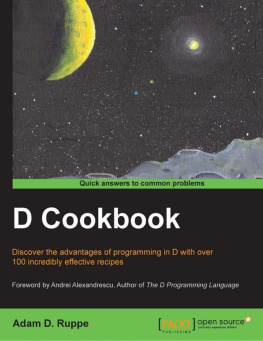
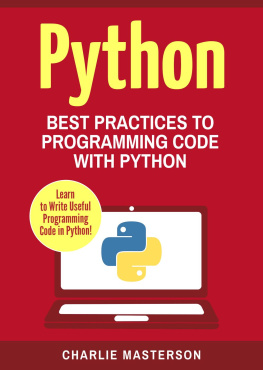
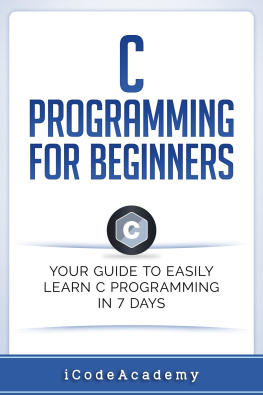
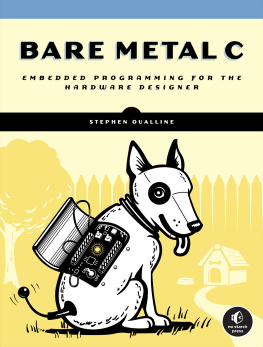
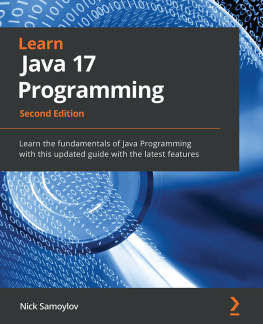

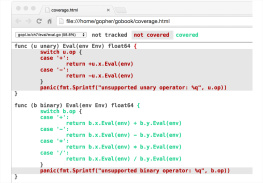
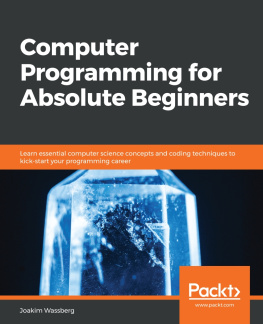
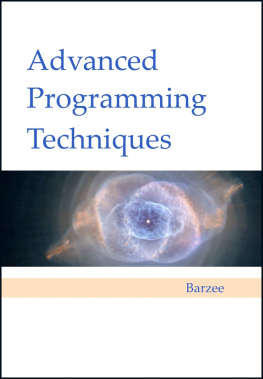
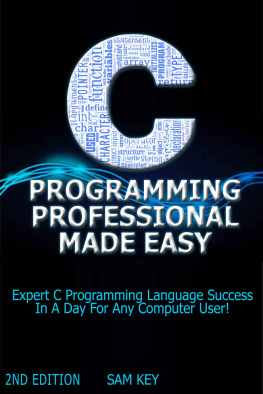
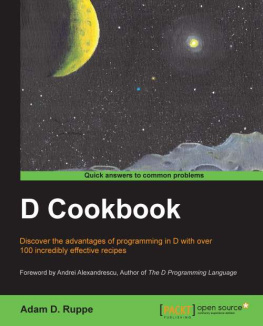
 D Cookbook Discover the advantages of programming in D with over 100 incredibly effective recipes Adam D. Ruppe BIRMINGHAM - MUMBAI D Cookbook Copyright 2014 Packt Publishing All rights reserved. No part of this book may be reproduced, stored in a retrieval system, or transmitted in any form or by any means, without the prior written permission of the publisher, except in the case of brief quotations embedded in critical articles or reviews. Every effort has been made in the preparation of this book to ensure the accuracy of the information presented. However, the information contained in this book is sold without warranty, either express or implied. Neither the author, nor Packt Publishing, and its dealers and distributors will be held liable for any damages caused or alleged to be caused directly or indirectly by this book.
D Cookbook Discover the advantages of programming in D with over 100 incredibly effective recipes Adam D. Ruppe BIRMINGHAM - MUMBAI D Cookbook Copyright 2014 Packt Publishing All rights reserved. No part of this book may be reproduced, stored in a retrieval system, or transmitted in any form or by any means, without the prior written permission of the publisher, except in the case of brief quotations embedded in critical articles or reviews. Every effort has been made in the preparation of this book to ensure the accuracy of the information presented. However, the information contained in this book is sold without warranty, either express or implied. Neither the author, nor Packt Publishing, and its dealers and distributors will be held liable for any damages caused or alleged to be caused directly or indirectly by this book.